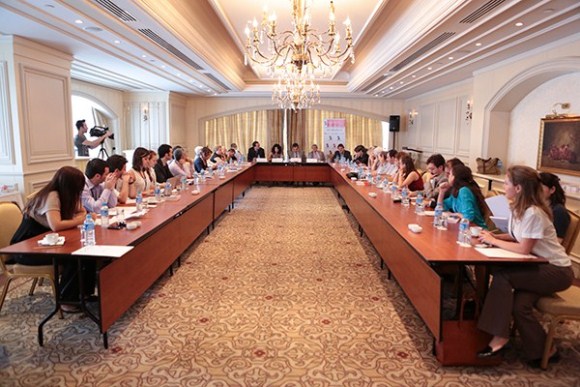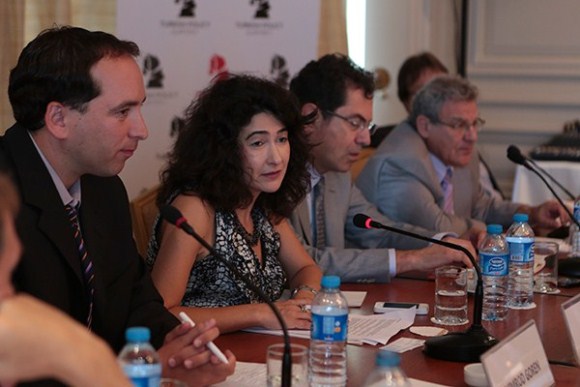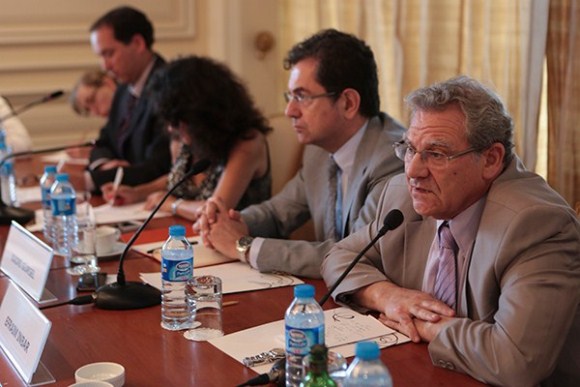|
On 2 July 2013, Turkish Policy Quarterly (TPQ), in partnership with the Friedrich Naumann Foundation for Liberty (FNF), hosted a roundtable discussion titled “The Evolving Relations of Turkey and Israel”. The panel featured Barçın Yinanç, Op-ed Editor for Hürriyet Daily News (HDN), as the moderator; Prof. Efraim Inbar, Professor in Political Studies at Bar-Ilan University and Director of Begin-Sadat Center for Strategic Studies (BESA); Dr. Nimrod Goren, Founder and Chairman of Mitvim, the Israeli Institute for Regional Foreign Policies; and Kadri Gürsel, Columnist for Milliyet, as speakers.

The panel began with welcoming remarks by Mr. Hans-Georg Fleck, the Resident Representative of the FNF in Turkey. Mr. Fleck mentioned that Turkish-Israeli relations were limited to a certain “strata of society” and then emphasized the important role of civil society in deepening relations between the two societies.
Professor Efraim Inbar began his speech by stating that Israel, through realpolitik lenses, always wanted to maintain good relations with Turkey. He explained that these relations are important especially due to Turkey’s Muslim population, since Israel wanted to dilute the religious dimension in its conflicts with the Arab world. According to Inbar, the honeymoon phase in the 1990s in Turkish-Israeli relations was a post-Cold War phenomenon. After 1991, he said, Turkey felt threatened by its neighbors such as Iran, Iraq, and Syria, which coincided with Israel’s concerns.Many countries sought to improve their relations with Israel as a result of changes within the international system, he added.
Professor Inbar noted that the cooperation in the 1990s continued through economic, military, diplomatic, and academic ties that were perceived as very useful for both sides. Pointing out the connection between the deterioration of relations and the shifting domestic and strategic outlook of Turkey under the AKP rule, Inbar said, “Israel-bashing brings Turkey, popularity in the Arab and Islamic world.” He stated that since what Israel does is less important in changing the state of relations, “the apology is basically irrelevant,” and “as long as the Turkish government believes that bad relations with Israel serves its foreign policy goals, there will be no change.”
Inbar further clarified his stance by claiming that the apology as a “mistake”. He backed up his argument by citing a recent poll commissioned by the BESA, which demonstrated that 71 percent of Israelis believed the apology was a mistake as well. Efraim Inbar also criticized Turkish support of Hamas, which he claims, makes Turkey perceived as hostile to the Israelis.
Dr. Nimrod Goren pointed out that Turkish-Israeli relations had its ups and downs throughout history, most of which were linked to the Israeli-Arab conflict. He stated that this linkage was evident even before the AKP rule, reminding the audience that the coalition government of Turkey prior to AKP had made very harsh statements on Israel’s operations in the West Bank during the Al-Aqsa Intifada. When the AKP initially came to power, Israel had fears and concerns about Turkey, he said. However, the first six years of Erdoğan’s rule “showed that these relations can continue.” Goren added: “this is an important point to remember, because people tend to say about Erdoğan in the last three years in Israel that he is inherently anti-Israeli and you cannot do any business with him. But that was not the case.” Goren also explained that, in the 2000s, the relations remained between the “old elites” and Israel has failed to develop channels with Turkey’s emerging social sectors. 
Dr. Goren argued that business cooperation reached a level independent from politics. He elaborated by stating that, “the ties between the business persons was so immense, that when the political level clashed, the business level, unlike the civil society level, managed to go on to reach new heights. The trade between the countries was at its highest point when the political relations between the two countries were at their lowest point.”
Dr. Goren emphasized that the apology issue was already on the table in 2011, since Israel believed that there was a necessity to mend with Turkey. Even though the initial reactions of the Israeli public towards the apology were positive, he mentioned that there were doubts within Israel that Turkey was sincere. Goren stated that, at this point, Israel needs to see something tangible. He also pointed that, after the apology, the channels at a civil society level are much more open.
In regards to the possibility of a renewed peace process between Israel and Palestine, Goren explicitly stated that Turkey can find itself a role within this process. But not having good relations with Israel, he argued, limits that role. Goren made a point that, even though it has some leverage over Hamas, Turkey does not have a game changing role in the Israeli-Arab peace process.
Kadri Gürsel claimed that “the normalization process was decided by Turkey after some assessment that the ‘Cold War’ mood [in Turkish-Israeli relations] was not useful and profitable anymore for Turkish interests in the context of Arab Spring. However, the normalization process is not advancing, he stated, as there is still no ambassador exchange.
He also brought up the unexpected critical developments regarding the Gezi protests in Turkey. He stated that a “normal” normalization process does not seem possible, given the reactions of Turkish authorities towards the protests. Gürsel claimed that these protests marked a historic defeat for Erdoğan and the AKP, as Erdoğan was unable to set the agenda of Turkey for almost more than a month. Gürsel emphasized that, after the Gezi protests, the AKP has turned to reactive policies instead of proactive ones. The Turkish-Israeli normalization process has become the victim of the lack of democracy in Turkey, he stated.

Erdoğan’s potential Gaza visit was discussed in the roundtable and Kadri Gürsel described this visit as a “false option” or a “non-option”. “This is the worst time for a Turkish Prime Minister to go to Gaza,” he said, arguing that it is not a good option due to the situation in Egypt. Furthermore, he claimed that it would be a huge loss of political capital, as a visit to Palestine should start with a visit to Ramallah, for which Turkey must normalize its relations with Israel in order to pass through Jerusalem. Gürsel also underlined that the window of opportunity for normalization of relations will not remain open forever.
In the lively Q & A that followed, prominent journalists, academics, and civil society members, and the moderator Barçın Yinanç enriched the debate with their comments on the issues discussed and brought up new perspectives on other issues such as; the role of track-two initiatives in Turkish-Israeli relations, the effects of Turkey’s relations with Hamas, the future of the two-state solution, Turkey’s potential mediator role in the Arab-Israeli peace process, and the prospects of Iran’s new political scene.
Please click here to watch the video of the roundtable.
Press Coverage of the Roundtable:
"Israelis Think Apology to Turkey ‘a Mistake’," Hürriyet Daily News, 3 July 2013
"Israeli Expert Says Jewish State May Revise its Position on Kurdish Issues," Today's Zaman, 3 July 2013
"Most Israelis don't believe Netanyahu's apology to Turkey was justified," The Jerusalem Post, 8 July 2013
Akiva Eldar, "Israeli Challenges in Reconciliation with Turkey," Al Monitor, 11 July 2013
|





